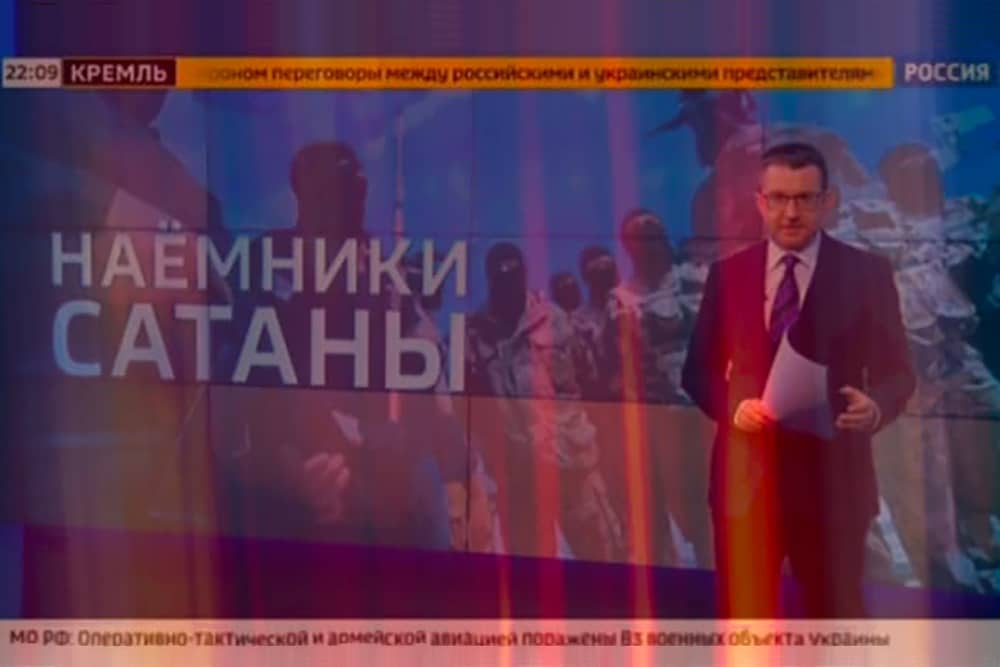FECRIS (European Federation of Centers for Research and Information on Sects and Cults), an umbrella organization funded by the French government, that gathers and coordinates “anti-cult” organizations throughout Europe and beyond, has been the subject of several of our articles recently, for their support to the Russian propaganda, which had started far before the current invasion of Ukraine, but recently culminated through their Russian representatives.
As FECRIS is a French registered organization, whose president André Frédéric is a Belgian member of the Parliament of Wallonia (one of the three self-governing regions of Belgium) and a Belgian Senator, when they felt they were in the spotlight, they also felt they should react to avoid becoming labelled as enemy agents by the French authorities. So instead of clearly distancing themselves from their Russian members, whose hate speeches and violent statements against Ukraine are now very well documented, they recently decided to publish a kind of counterattack on their website.
FECRIS claims to be falsely labelled “pro-Russian”
They claim that they are “systematically attacked by an organised movement that supports cultish/sectarian organisations”, and falsely labelled as “pro-Russian”, and they advance a weird argument that they expect would vindicate them: “FECRIS counts Ukrainian associations among its members.”
Whilst that does not change anything to the fact that they have been working with the Kremlin for years and have supported incredible anti-Western and anti-Ukrainian statements and acts during this time, we thought that we should dig into their claim to have “Ukrainian members”. And what we found is interesting.
On their website, they feature two Ukrainian member associations. One is “Dneprpetrovsk City Center for the help to Victims of Destructive Cults – Dialogue”, which in fact has not published one line on their website since 2011. It looks like this member association stopped its activity more than 10 years ago but still remains on the FECRIS website to increase the number of members.
FECRIS Ukrainian rep in “Defense of Orthodoxy from infidels”
The second one is “F.P.P.S. – Family and Personality Protection Society”. Whilst their website is not active since 2014 (which means since the Maidan revolution), we found that one of their members, which was speaking during the last event they organized in Odessa on February 21, 2014, less than a week before the Russian invasion began, was Vladimir Nikolaevich Rogatin, a Ukrainian scholar who is board member of the All-Ukrainian Apologetic Center in the name of St. John Chrysostom (Moscow Patriarchate), and teaches at the Kazan Federal University, in Russia. The All-Ukrainian Apologetic Center in the name of St. John Chrysostom’s activities are “Defense of Orthodoxy from infidels, non- Orthodox, pagan, occult and godless delusions”. Aims that tell the whole story.

Rogatin is an interesting character. He almost uniformly introduces himself as the Ukrainian representative of FECRIS, and in fact is very “pro-Russian”. Since 2010 he wrote about the impact of “cults” and non-Orthodox religions on the contemporary Ukraine. And since the “Euromaidan”.[1] , he wrote a series of articles to show how the changes in Ukraine were led by new religious movements (“cults”, in his mind) as well as Muslims, and how the Russian Orthodox Church would have been persecuted under the new governance bodies, pointing what he called “the legal nihilism on the part of the authorities in relation to Orthodox believers”.
FECRIS rep: Ukraine plagued by Satanism
In 2014, he started to attribute the cause of the Euromaidan to the harmful influence of new religious movements. He added that those were already behind what had happened in Ukraine in 2004 (orange revolution).[2] That was completely aligned with the Vice-president of FECRIS Alexander Dvorkin who did the same at the same period.
In July 2014, he was also one of the first, if not the first, to spread the idea that Ukraine was plagued by Satanism, which he linked to Nazism. In an interview with bankfax.ru:
“There is an increase in the influence and presence of various kinds of satanic cults in Ukraine, said Volodymyr Rogatin, corresponding member of the European Federation of Centers for Research and Information on Sectarianism (FECRIS). According to various estimates, there are more than a hundred satanic groups operating in our country, with a total of about 2,000 adherents.”
Few months later, he developed in another interview in a Russian Newspaper:
“According to Vladimir Rogatin, a correspondent member of the European Federation of Centers for Research and Information on Sectarianism, living in Nikolaev, ‘for at least three years, graffiti has been updated in front of the wooden (symbols of WotanJugend). This neo-Nazi group, which has existed in Russia and Ukraine for several years, proclaims the worship of the god Wotan (Odin). Judging by the messages on the group's Internet resources, its members took an active part in the events on the Independence Square in Kyiv’. According to Rogatin, ‘after they returned from the Maidan, they painted the whole city with their graffiti.’ Some of the WotanJugend members then joined the ranks of the Azov Battalion.”

In January 2015, he participated with other representatives of FECRIS to a huge Russian Orthodox event in Moscow, the XXIII International Christmas Educational Readings, where he explained how the “neo-pagan cults” were operating in Ukraine.
Since, he continued to publish about cults and satanism in Ukraine, adding the participation of Ukrainian Muslims to his rhetoric about the causes of the (not beloved) Euromaidan.
FECRIS inspiring Kremlin’s apparatchiks
It’s interesting to note that this rhetoric of satanism plaguing Ukraine and being the cause of Euromaidan hasn’t fallen on deaf ears. Indeed, it’s today a real trend for high-ranking Russian government leaders to use it and justify the war by the necessity to “de-satanize” Ukraine. Number 2 of the Security Council of the Russian Federation Alexei Pavlov recently declared: “I believe that with the continuation of the ‘special military operation’ it becomes more and more urgent to carry out the de-Satanization of Ukraine, or, as the head of the Chechen Republic Ramzan Kadyrov aptly put it, its ‘complete de-Shaitanization2’”. He added that “hundreds of sects are operating in Ukraine, trained for a specific purpose and flock.” Pavlov mentioned the “Church of Satan”, which allegedly “spread across Ukraine”. “Using network manipulation and psychotechnologies, the new government turned Ukraine from a state into a totalitarian hypersect,” Pavlov said.
Even the French President Macron has been called a “pitiful and shabby little satanist” by TV presenter Vladimir Soloviev (On Rossiya 1, the main TV Chanel in Russia). And Putin himself, on September 30, portrayed the annexation as a holy war against the West, which is helping Ukraine to defend itself, justified because “They [the West] are moving toward open satanism”. So well done FECRIS, you’re a hit!
Was it a decent defense?
So finally, while we are not saying that all Ukrainians associated with FECRIS are pro-Russian, and while we agree that FECRIS has indeed Ukrainian members, we notice that one of the two Ukrainian FECRIS member associations is dead for more than 10 years, and the second one has been associated with and represented by one of the most pro-Russian Ukrainians, who has been pushing (and inspiring) the Kremlin’s propaganda (as every Russian FECRIS member) against Ukraine since 2014.
So, was that a decent defense to argue that FECRIS had Ukrainian members?
[1] Euromaidan is the name given to the pro-European protests protests were sparked by the Ukrainian government’s sudden decision not to sign the European Union–Ukraine Association Agreement, instead choosing closer ties to Russia. Ukraine’s parliament had overwhelmingly approved of finalizing the Agreement with the EU, while Russia had put pressure on Ukraine to reject it.
[2] Vladimir Nikolaevich Rogatin, 2014, “Features Of The Research Approaches In The Study Of New Religious Movements In Contemporary Ukraine”, QUID: Investigación, Ciencia y Tecnología, 1401-1406
[3] Shaitanization: Shaitan, Sheitan is an Arabic word that means devil. In a broader sense, sheitan can mean: demon, perverse spirit. This term is etymologically derived from Aramaic and Hebrew: satan





